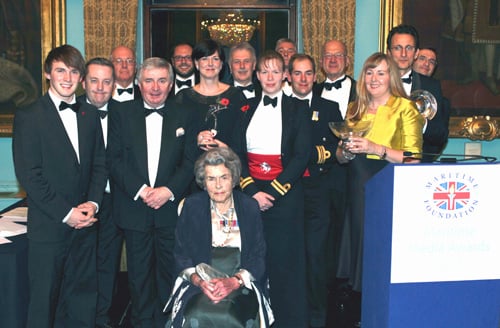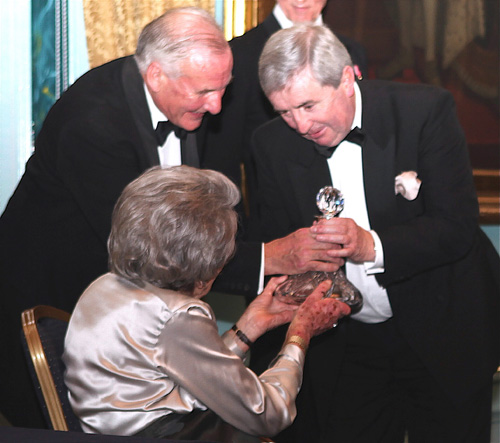Displaying items by tag: British Maritime Foundation
MacSweeney Receives British Honour for Maritime Journalism Work
For the first time an Irish maritime journalist was honoured by the British Maritime Foundation at its annual awards ceremony in London. The Desmond Wettern Award was presented to Afloat's Tom MacSweeney. It is made to the writer, broadcaster, journalist who in the opinion of the Foundation's Awards Committee has made the most constructive contribution to generating awareness of maritime issues.
The Awards Committee said that the significance of issues chosen, work in radio, television and newspapers and magazines, the range and depth of analysis and impact on public awareness of maritime issues were the reasons for the award to be made to a journalist outside of the UK for the first time.
There was a £1,000 award with the trophy which MacSweeney donated at the ceremony back to the Foundation for support to their work, particularly in the area of tall ships opportunities and sea training for young people. The Foundation will be offering places to Irish people and are interested in extending the work of the Foundation to Ireland.
The Award was presented by Countess Mountbatten, President of the Maritime Foundation at a ceremony in the Institute of Directors building in Pall Mall, London.
Tom MacSweeney is a columnist with Afloat, Ireland's national sailing magazine and Special Correspondent with Ireland's national fishing industry newspaper, The Marine Times. He was formerly Marine Correspondent with RTE, Ireland's national radio and television service and is a former winner of Ireland's maritime person of the year award as well as a maritime author.
TV historian Dan Snow won the Donal Gosling Award for his four-part BBC2 series, Empire of the Seas. This is for the best television, film or radio contribution.
Over 200 celebrities, journalists, business figures and senior naval officers attended this year's Maritime Media Awards, held at the Institute of Directors in London Foundation president Countess Mountbatten of Burma presented prizes to winners of the six categories:
• The Desmond Wettern Media Award for the best journalistic contribution – freelance writer and broadcaster Tom MacSweeney for exemplary coverage of maritime matters
• The Donald Gosling Award for best television, film or radio contribution – Dan Snow, Empire of the Seas
• The Desmond Wettern Fleet award for best media contribution from HM Ship, submarine, Royal Navy Air Squadron or Royal Marine unit – HMS Kent
• The Mountbatten Maritime Award for best literary contribution – Richard Guilliatt and Peter Hohnen, The Wolf
• The Maritime Fellowship Award for an outstanding lifetime contribution in a particular maritime field – Undersea explorer David Mearns
• The Society for Nautical Research Anderson Medal for best contribution to maritime history – Nicholas Black, Head of History, Dulwich College for his book, British Naval Staff in the First World War
 \
\
The awardees in Pall Mall

Tom MacSweeney receives the award from Countess Mountbatten
Read Tom MacSweeney's weekly 'Island Nation' blog HERE




























































